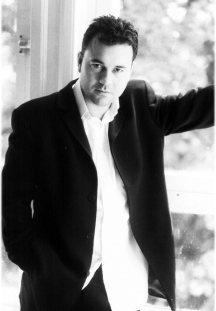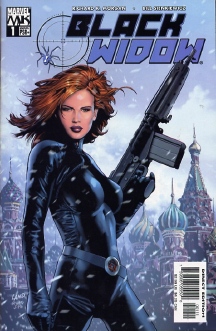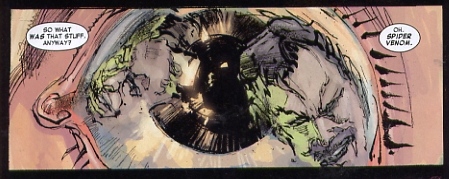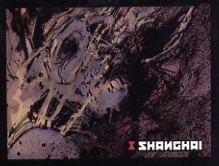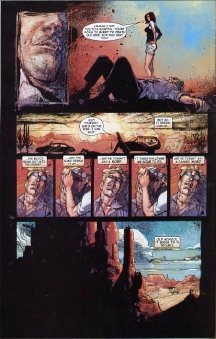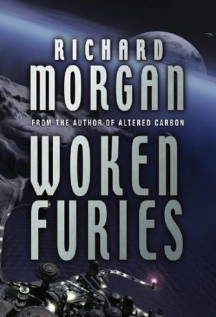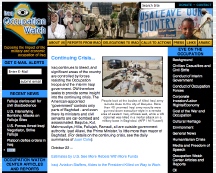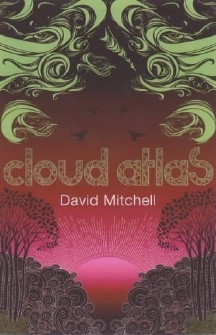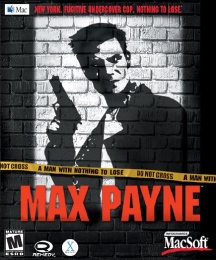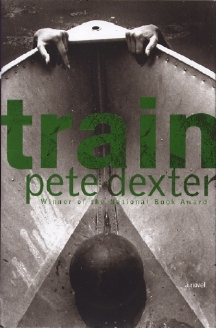"They're lying to you."
An Interview with Richard K. Morgan
The Agony Column for October 27, 2004
Interview Conducted by Rick Kleffel
An Interview with Richard K. Morgan
The Agony Column for October 27, 2004
Interview Conducted by Rick Kleffel
But recently I noticed that he'd written the script for a Marvel Comic, that the movie of 'Market Forces' was moving forward and that his new novel was done, so I decided to get in touch with him again. Coming out early next year is 'Woken Furies', a new Takeshi Kovacs novel, which, according to his editor over at Victor Gollancz is his best yet. He kindly consented to update my readers as to where to look for what he's doing and why he's doing it. RK: Richard, can you tell us what's happening with the film adaptation of 'Market Forces'?
RK:Will they be using your screenplay? RKM: No – to be honest with you, the original screenplay was never really that good. I cannibalized it while I was writing the novel, and while the ideas behind it were solid enough, I found myself constantly dismayed by the poor quality of the writing. I guess I was a lot younger then – you’re talking a good ten or eleven years ago, after all. So I destroyed it when I finished the novel – to borrow a quote from the end of the movie Mad Max 2, it exists now only in my memories. RK:I noticed the other day that you had written a comic for Marvel, Black Widow. Can you tell me why you did it; I mean did you seek them out or did they seek you out? RKM: Very much the latter. Jenny Lee, an editor at Marvel, had read Altered Carbon and was apparently very taken with the way I’d handled the female characters. She liked the fact that they were good, bad and indifferent human beings independently of their sex, and she wanted to see if she could get me to import that approach into a Marvel comics series. She ran a couple of characters by me, and I fixed on Black Widow immediately. RK:And tell us about why a novelist would want to write for the comics.
RK: Could you tell the readers a bit about the process of writing for the comics and how it differs from writing prose in either short stories or novels? RKM: It’s very different. Above all what you notice is the extreme economy of the process. Any prose you lay down is purely descriptive of what a given panel is going to show, so it’s a stripped and strictly communicative form of writing, without a great deal of polish. By far the bulk of your writerly attention is going into the dialogue, not least because you’ve got a very limited amount of space in which to play with and you have to pare it down to a razor’s edge of delivery. An average comic is twenty two pages, with about five to seven panels a page – when you’re used to turning out four hundred page novels, that seems like an incredibly small scale to work on. But the discipline required is fascinating to learn, and I’ve been lucky enough, in Jenny Lee, to have a fine instructor.
RKM: That’s mine. Obviously, where you’re working with an existing character, you need to take prior history into account, but that’s really just a springboard, especially when you’re taking things in a new direction like this. I put in a six issue story arc, plus notes on what I wanted to do with the character, and we took it from there. Then you go back and write it, panel by panel, page by page, issue by issue. And obviously there are quite a lot changes once you start doing that, especially when you’re as new to the whole game as I was. For example, my sketch of what I thought would be Issue One turned out to have more than enough material for two full issues, so we had to split it in the middle and still pare it down a bit. RK: How different is the collaborative process between a writer, an artist and the editors for a particular series from the process of writing a novel and turning it in to an editor at a publisher?
RK: Do you have other comic projects plans? RKM: Not as yet. To be honest, there’s far more of the obsessive control freak in me than the collaborative professional. Right now it’s fine because on artwork I’ve been lucky enough to get comics legend and dark art meister Bill Sienkiewicz and another guy, Goran Parlov, who’s got a firm grasp of where we’re going with the tone of this thing. These guys, plus the enthusiasms and tastes that I share with Jenny Lee have ensured that writing Black Widow is turning out to be a great experience. But whether that could be duplicated with a different team of people is by no means certain – and I don’t want to give up more time from my novel-writing unless I can be guaranteed the same ride I’m getting now with Jenny, Bill and Goran. RK: How's the pay?
RK: When 'Altered Carbon' was optioned by Joel Silver, producer of The Matrix movies, you were able to devote yourself to full-time writing. Has that project gone alone any further? RKM: Hard to say. The option was renewed in May for another eighteen months, so there’s still enthusiasm out there for making the movie, and that’s always good to know. I understand there’s been a change of writer for this draft of the script, but aside from that, I’ve heard nothing more. RK: Finally, Simon Spanton over at Gollancz tells me that you've just turned in 'Woken Furies'. Is it a new Takieshi Kovacs novel? RKM: It is indeed! RK: What can you tell us about writing this novel, having written the first two then diverted to 'Market Forces'? RKM: I think it was good to get away from Kovacs and his world for a while – but it’s good to be back! Writing Market Forces, apart from allowing me to get a furious political critique out of my system, gave me the chance to step back and assess the Kovacs series at a distance. That in turn helped me decide what I wanted to do with it next. RK: What can you tell us about the novel itself -- without giving away any more than we'll read on the dust jacket?
RK: And having finished this novel, can you give us a clue what novel is next? RKM: Well, not much of clue because I’ve only just started writing it and I’ve yet to see where it’ll go myself! The next book won’t be Kovacs, it’s another near (or at least nearER) future novel, though not a political allegory in the way Market Forces was. There’ll be a number of themes, including genetics and the nature/nurture debate and it will be, like all my stuff, fast moving, violent and character driven. Watch this space! RK: Are there any magazines that you see as key reading or influential? RKM: Not really – I’ve got a subscription to a British political magazine called Prospect, which is quite informative, I buy the Guardian more or less daily, and I read the New York Review of Books from time to time. But in the end these just form part of a spectrum of data that sits and stews in my head and sometimes coughs up an idea. In general, I’d say it’s vital, not just as a writer but as a functioning member of society, to be well informed politically, but how you go about that is pretty much an individual thing. Key approach: if your news sources are telling you that everything’s hunky dory and under control – then change them, because they’re lying to you. Oh yeah, and avoid the Economist like the plague – fucking free-market Moonies. RK: Are there any websites you see that have a corresponding power?
RK: How do you feel about the state of web publishing now, and what do you see as its potential for the future? RKM: I don’t really know enough about it to have an intelligent opinion – but off the top of my head I’d say the potential for the future is immense. It always is with media technology. RK: How do you see the market for fiction shaping up over the next couple of years?
RK: We've been hearing a lot of horror stories about the decline of reading. Do you buy them? RKM: No. Again, I can’t answer for the US, but book sales are up in the UK. We appear to be reading (or at least buying the books to read) more than ever. Only a couple of weeks ago, I was in Madrid and I heard the Spanish minister of culture there citing book readership figures in the UK as something for contemporary Spanish culture to aspire to. Nice to hear that in fact – usually the only things the British are famous for in Spain are appalling cuisine, football hooliganism and loud and offensive drunkenness. RK: Is the increasing market for graphic novels going to have an impact on the market for pure fiction? RKM: Well possibly, but not, I think, the negative influence that everyone assumes. I’m reading far more graphic novels these days than I was a couple of years ago, but I haven’t noticed a corresponding drop in the amount of prose fiction I read. It’s a different form, so it’s unlikely to act as a substitute. And it doesn’t take long to read a graphic novel, so it’s not that you’re displacing valuable time from reading other things. Hopefully, what will happen is that there’ll be some cross-fertilisation and people who habitually read comics will start to pick up novels by authors who work in both fields (like me!). You can see this already happening with the huge success Neil Gaiman (Sandman) has had with his prose fiction in recent years. And of course we’ve also got to hope that some of the snobbery from literary quarters about the comics will start to burn off under the realization of how much really very good stuff there is out there in the graphic form. RK: How about the market for video game scripts versus movie scripts versus fiction?
RK: Could you talk about the challenges of writing for media that are increasingly interactive? RKM: Er – not really, because I don’t. RK: For example, when you write for movies you now can take into account the fact that at some point, there will be a DVD, with both a commentary track and a media that can be halted, skipped and viewed asynchronously. Video games take this a step further RKM: Yeah, you can take all that into account. But, in my humble opinion, if you did, you’d be spiking your own creative guns. For example, I’ve been approached by a number of quite big name game companies about the possibilities of a Takeshi Kovacs game, and in a way that’s quite flattering (as well as potentially very lucrative). Maybe it’ll even happen at some point. But if I sit down to write a book and allow myself to think that there might be a video game of it one day, allow myself to worry about that and write accordingly, then it’s going to distort what I really want to put on the page. You stop being a (creative) writer, and become a prose prostitute, a sort of give-the-people-what-they-want word technician. And where’s the point in that? The whole deal with being a writer is that you write what you want, what you feel and then you hope that it’s a valid act of communication and that it’ll connect with other people. If you’re lucky it will. But as soon as you start actively thinking about cross-marketing and product placement, you’ve reduced that act of communication to a street walker’s come-on. It may pay well, but it’s not something you’re going to feel especially proud of. And I think sooner or later that knowledge, that cynicism, will eat into your writing and in the end it’ll kill whatever it was that drove you to be a writer in the first place. RK: Websites and blogs also allow for new forms of fiction, to wit, Alistair Langston's 'Aspects of a Psychopath'. The writer started a blog, which purported to be the exploits of a serial killer, spelled out in gruesome detail. Eventually, it was developed into a novella from Telos UK. You've just started your own website. What brought you to this point? RKM: Really, the website was just a point of contact – it became apparent by the time Broken Angels came out that a lot of people were trying to get in touch with me with everything from simple well-wishing and enthusiasm about my work to actual proposals for things like a Kovacs platform game or foreign rights for Altered Carbon. The website seemed like an obvious solution to this – it makes me visible to anyone who wants to find me, maybe answers some of their more basic curiosities about what makes me tick, and offers a coms channel should they want to talk to me. Anyone who hits the contact button on the site will hear back from me at some point, even if it’s simply to say thanks for the interest. RK: Are you reading or watching anything that my readers should be reading or watching?
RK: Is there anything on the horizon that we should be looking forward to, beyond your own work? RKM: Again, I’m not really up to speed here – I’d like to say I’m looking forward to the Sin City movie, but I think I’ll reserve judgment until it’s out. I find it hard to believe that a mainstream Hollywood movie will be permitted the extremes of Miller’s original graphic novels –or their brutally grim endings. Still, we live in hope. RK: Any final words or warnings? RKM: Uh – vote Kerry, I guess, if you’re not going to already. Please. Thank you. RK: Let me send you the thanks of my readers along with my own. This is greatly appreciated! |
